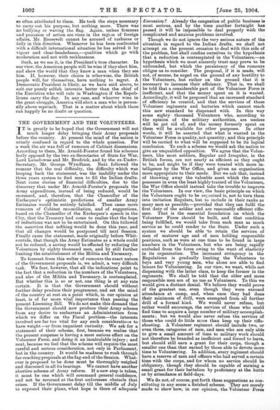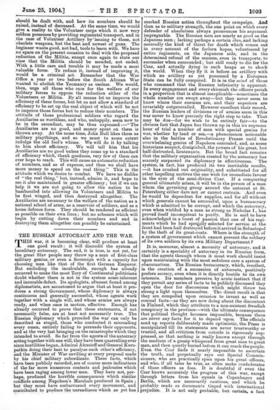I T is greatly to be hoped that the Government will
not much longer delay bringing their Army proposals before the country. At present the mind of the nation is utterly confused. in regard to the whole question. For a week the air was full of rumours of Cabinet dissensions. According to them, Mr. Arnold-Forster found his schemes hotly opposed by the two ex-Secretaries of State for War, Lord Lansdowne and Mr. Brodrick, and by the ex-Under- Secretary, Mr. George Wyndham. Next followed the rumour that the real difficulty, the difficulty which was keeping back the statement, was the inability under the three years system to find men to fill the Indian drafts. Next came stories of financial difficulties, due to the discovery that under Mr. Arnold-Forster's proposals the Army expenditure, instead of being reduced, would be increased, and, therefore, that the Chancellor of the Exchequer's optimistic predictions of smaller Army Estimates would be entirely falsified. Then came more rumours of Cabinet reconciliation, and of suggestions, based on the Chancellor of the Exchequer's speech in the City, that the Treasury had come to realise that the hope of reductions was not to be entertained. On this followed the assertion that nothing would be done this year, and that all changes would be postponed till next Session. Finally came the statement, made originally before Whit- suntide, that though the Army Estimates as a whole could not be reduced, a saving would be effected by reducing the Volunteers by eighty thousand men, and by still further limiting the establishment of the Militia and Yeomanry.
. To forecast from this welter of rumours the exact nature of the Government proposals is, we admit, a very difficult task. We fear, however, that all the indications point to the fact that a reduction in the numbers of the Volunteers, and also of the Militia and Yeomanry, is contemplated. But whether this is so or not, one thing is at any rate certain. It is that the Government should without further delay produce their programme, and set the mind of the country at rest on a point which, in our opinion at least, is of far more vital importance than passing the present Licensing Bill. We do not make this demand that the Government should now produce their Army scheme from any desire to embarrass an Administration from which we differ on the Fiscal problem—the interests involved are far too -vital for any such considerations to have weight—or from impatient curiosity. We ask for a statement of their scheme, first, because we realise that the present suspense is having a most serious effect on the Volunteer Force, and doing it an incalculable injury ; and next, because we feel that the scheme will require the most careful and serious consideration, not only in Parliament, but in the country. It would be madness to rush through far-reaching proposals at the fag-end of the Session. What- ever is proposed to be done must be thoroughly weighed and discussed in all its bearings. We cannot have another abortive scheme of Army reform. If anew step is taken, it must be one which will command general-confidence, and not be reversed at the first unforeseen obstacle that arises. If the Government delay till the middle of July to expound their plans, what hope is there of adequate Though we do not ignore the very serious nature of the situation in regard to the Indian drafts, we shall not attempt on the present occasion to deal with this side of the problem, but shall confine ourselves to the hypothesis that a reduction is contemplated in the Volunteers,—an hypothesis which we most sincerely trust may prove to be unfounded, but which the persistency of the rumours obliges us to consider. The proposal, if it is made, will not, of -course, be urged on the ground of any hostility to the Volunteers, but rather on the ground that it is necessary to increase their efficiency. That is, we -shall be told, that a considerable part of the Volunteer Force is inefficient, and that the money spent on it is wasted. Accordingly, it will be proposed that an increased standard of efficiency be created, and that the services of those Volunteer regiments and batteries which cannot reach this new standard be dispensed with. In this way some eighty thousand Volunteers who, according to the opinion of the military authorities, are useless will be got rid of, and the money formerly spent on them will be available for other purposes. In other words, it will be asserted that what is wanted in the :Volunteer Force is quality, not quantity; and this principle will be carried to what will be supposed to be its logical conclusion. To such a scheme we would ask the nation to give an unqualified opposition. We agree that the Volun- teers, like most soldiers, Regular and Irregular, in the British forces, are not nearly as efficient as they ought to be, and might be if they were treated with more in- telligence by the War Office, and given an organisation more appropriate to their needs. But we ask that, instead of throwing away the valuable asset which the nation possesses in even the least highly trained of the Volunteers, the War Office should instead take the trouble to improve the Volunteers. In our view, the basic principle on which the Volunteers ought to be organised is, not to turn them into imitation Regulars, but to include in their ranks as many men as possible,—provided that they can fulfil the first duty of the soldier and are reasonably efficient rifle- men. That is the essential foundation on which the Volunteer Force should be built, and that condition being fulfilled, we would take from each man as much service•as he could render to the State. Under such a system we should be able 'to retain the services of men of maturer age and of men holding responsible positions, such as were at one time to be found in large numbers in the Volunteers, but who are being rapidly excluded from the force owing to the want of elasticity in its organisation. The increased stringency in the Regulations is gradually limiting the Volunteers to boys and very young men, who alone are able to find leisure for Volunteering. In our view, we want, while not dispensing with the latter class, to keep the former in the regiments. We shall be told that the older and more responsible men are of no use as Volunteers. To this we would give a distinct denial. We believe they would prove of the greatest use, even though they were excused attendance at camp, and, when once they had done their minimum of drill, were exempted from all further drill of a formal kind. We would never refuse, but rather would encourage, the services of those who could find time to acquire a large number of military accomplish- ments; but we would also never refuse the services of those who could do little more than keep up their rifle- shooting. A Volunteer regiment . should include two, or even three, categories of men, and men who are only able to give a small amount of time to military work should not therefore lie branded as inefficient and forced to leave, but should still earn a grant for their corps, though a smaller one than that earned by those able to devote more time to Volunteering. In addition, every regiment should have a reserve of men and officers who had served a certain time with the corps, and for whom no service should be obligatory, though they should be capable of earning a small grant for their battalion by pioficiency at the butts or by attendance at field-days.
We do not, of course, put forth these suggestions as con- stituting iii any sense a finished scheme. They are merely made to show how, in our opinion, the Volunteer Force should be dealt with, and how its numbers should be raised, Instead of decreased. At the same time, we would give a, reality to the Volunteer corps which it now very seldom possesses by providing regimental transport, and. in the case of Volunteer Artillery bjoissuing to them, not obsolete weapons, but the best and newest of guns. The ;beginner wants good, not bad, tools to learn with. We have no space on the present occasion to deal with the proposed ,reduction of the Militia, except once again to state our ;view that the Militia should be mended, not ended. With a little care and trouble it may be made a most valuable force. To reduce it, instead of improving it, would be a criminal act. Remember that the War Office a, year or two before the South African War wanted to abolish the Yeomanry as useless. We would, then, urge all those who care for the welfare of our military forces to oppose the reduction either of the :Volunteers or Militia. By all means let us improve the efficiency of these forces, but let us not allow a standard of efficiency to be set up tha real object of which will be not to improve those forces but to. reduce their numbers. The attitude of those professional soldiers who regard the Auxiliaries as worthless, and who, unhappily, seem now to be in the ascendant, may be thus expressed :—" The Auxiliaries are no good, and money . spent on them is thrown away. At the same time, John Bull likes them as military playthings, and, so we must to some extent indulge the old fool's whims. We will do it by talking to him about efficiency. We will tell him that his ,Auxiliaries are no good unless they come up to a standard of efficiency which, thank goodness, very few of them can ever hope to reach. This will cause an automatic reduction of numbers, and so of expense, and then we shall have more money to spend on the real thing." This is the attitude which we desire to combat. We have no dislike of "the real thing," but, instead, admire it, and hope to see it also maintained in greater efficiency ; but if we can help it we are not going to allow the nation to be bamboozled into allowing its Volunteers and Militia to be first winged, and then destroyed altogether. The Auxiliaries are necessary to the welfare of the nation as a national school of arms, as a reservoir of soldiers, and as a home defence force. They should be rendered as efficient as possible on their own lines ; but no schemes which will begin by cutting down their numbers and end in destroying them altogether can possibly be entertained.



























































 Previous page
Previous page